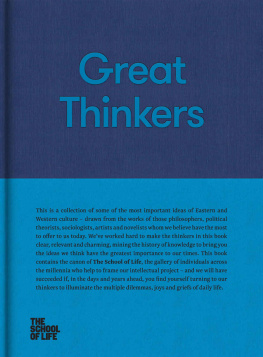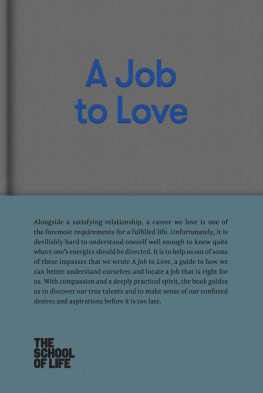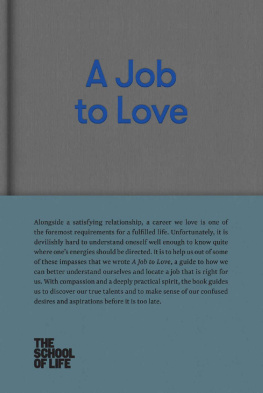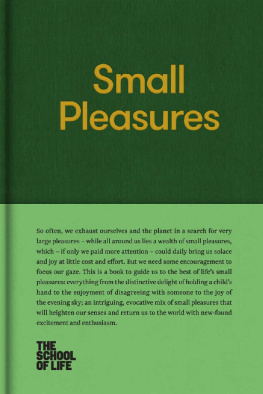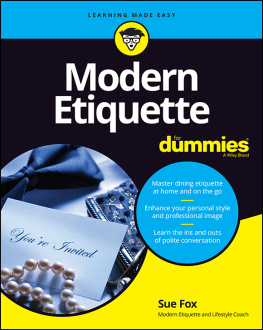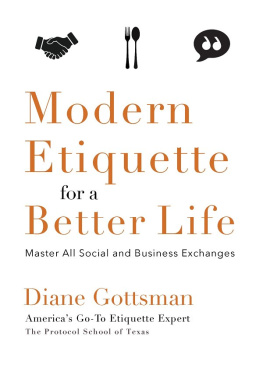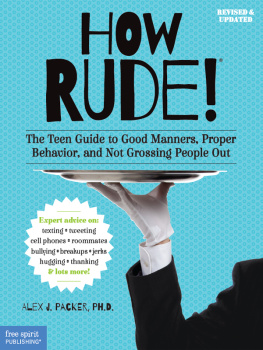Contents
Guide
THE SCHOOL
OF LIFE
GUIDE TO
MODERN MANNERS
THE SCHOOL
OF LIFE
GUIDE TO
MODERN MANNERS
20 SKILLS
TO NAVIGATE THE
DILEMMAS
OF SOCIAL LIFE
Published in 2019 by The School of Life
70 Marchmont Street, London WC1N 1AB
Copyright The School of Life 2019
Designed and typeset by Marcia Mihotich
Printed in Italy by Stamperia Artistica
All rights reserved. This book is sold subject to the condition that it shall not be resold, lent, hired out or otherwise circulated without express prior consent of the publisher.
A proportion of this book has appeared online at
www.theschooloflife.com/thebookoflife
Every effort has been made to contact the copyright holders of the material reproduced in this book. If any have been inadvertently overlooked, the publisher will be pleased to make restitution at the earliest opportunity.
The School of Life is a resource for helping us understand ourselves, for improving our relationships, our careers and our social lives as well as for helping us find calm and get more out of our leisure hours. We do this through creating films, workshops, books and gifts.
www.theschooloflife.com
ISBN 978-1-912891-27-6
10 9 8 7 6 5 4 3 2 1
1
HOW TO TELL WHEN YOU ARE BEING A BORE
2
HOW TO WRITE AN EFFECTIVE THANK YOU LETTER
3
HOW TO CHOOSE A GOOD PRESENT
4
HOW TO APPROACH STRANGERS AT A PARTY
5
WHAT TO DO AT PARTIES IF YOU HATE SMALL TALK
6
HOW TO SHAKE SOMEONE OFF AT A PARTY
7
HOW TO WIN PEOPLE OVER
8
WHETHER, AND HOW MUCH, TO PRAISE
9
HOW TO SUCCESSFULLY DISAPPOINT SOMEONE SOCIALLY
10
HOW TO BE COMFORTABLE ON YOUR OWN IN PUBLIC
11
HOW TO DEAL WITH UPSETS IN SERVICE SITUATIONS
12
HOW TO BECOME SOMEONE PEOPLE WILL CONFIDE IN
13
HOW TO TALK TO A BEREAVED ACQUAINTANCE
14
HOW TO SPILL A DRINK DOWN YOUR FRONT AND SURVIVE
15
HOW TO DEAL WITH THE SUBTEXT
16
HOW TO STOP WORRYING WHETHER OR NOT THEY LIKE YOU
17
HOW TO BE A GOOD GUEST
18
HOW TO TELL SOMEONE THEY HAVE SPINACH BETWEEN THEIR TEETH
19
HOW TO MAKE PEOPLE FEEL GOOD ABOUT THEMSELVES
20
HOW TO FACE SOCIAL CATASTROPHE
INTRODUCTION
Social life is full of minor but acute dilemmas. We get stuck at a gathering with someone unusually tedious and wonder how to move on without causing offence. In the course of introducing one friend to another, we realise that we have forgotten one of their names. We run into a disappointed ex while on an early date with a new partner. We spill a Bloody Mary across a hosts absorbent pale sofa.
The dilemmas are at one level pathetically insignificant. But they sit astride some of the largest and most serious themes in social existence: how to pursue our own agenda for happiness while at the same time honouring the sensitivities and wishes of others; how to convey goodwill with sincerity; how to repair damage caused by inattention or self-centeredness; how to be kind without being supine or sentimental.
These dilemmas fall into a category that once belonged to the field of etiquette or manners. The modern age has generally had enough of manners, equating them with an aristocratic era of subterfuge and fakeness; we are advised to go with our feelings and tell it the way it really is.
But the result, in practice, is that we are often confused as to how to act around others and discharge our obligations to them. What follows are twenty case studies that focus on common social dilemmas and our possible responses to them, that together try to contribute to a philosophy of graceful and generous conduct. Manners are far from negligible fancies; they stand at the day-to-day end of a hugely grand and dignified mission: the creation of a kinder world. 

1
HOW TO TELL
WHEN YOU ARE
BEING A BORE
Some of the reason why we end up being inadvertently rude to people is that they are so polite with us in a way that doesnt give us sufficient information as to whether we might be inconveniencing or boring them.
It can at points be hard to tell whether what we are saying is really of any interest to those we are addressing. Few people other than our partner in a bad mood or our adolescent child will ever directly cut us short and announce that they find us dull. It is as a result all too easy to develop an impression of our own compelling nature. If we were to ask our interlocutor, Am I boring you? we can be certain that the one answer we would never receive is: Well, since you ask, yes you are rather. If we choose to wait until people fall asleep while were recounting an anecdote or check their phone as we get to the punchline of our joke, it will be too late. Our reputation as a windbag will long ago have been sealed.
Fortunately, most of what people need to tell us does not have to be directly stated; the evolution of a civilisation can be measured by the scope of its dictionary of unspoken signals. The clue to anothers interest lies not in their overt declarations but in their degree of responsiveness to our words. We can gauge interest by studying how closely and logically anothers questions follow on from our statements; how fast their replies come; how invested they seem in their emphases; whether their eyes meet ours when we stress a point; and the degree of elasticity and benevolence in their smile. To a trained observer, an urgent cry I need to go to bed now can be communicated by nothing more brutal or direct than a gaze at the overhead smoke alarm that is held a fraction too long or a Thats wonderful that lacks a minute but critical dose of wonder.
It is mostly easy enough to note the cues; when we ignore them, it isnt that we arent receiving them, but that we are somehow opting not to register them and we are not doing so for a poignant reason: because we cannot bear to imagine that we might be boring, because the idea of not belonging sufficiently deeply in anothers life is untenable; because we are unreconciled to the fundamental loneliness of existence and the tragic disjuncture between what we want from others and what they may be prepared to provide. We grow deaf from the rigidity of our need, not from any basic failure of sensitivity.
Somewhere along the line the idea of not pleasing someone conversationally may turn from a reasonable risk into a prospective catastrophe that must be manically warded off. We become wilfully oblivious; we give up seeking to delight and settle instead on the more modest hope of not being actively thrown out. The insult to our self-love that we read into anothers bored reaction feels too great, and our resources to deal with it too slim for us to take in the meaning of the long pauses and wandering eyes. We overlook the cues because what they indicate to our unconscious minds isnt the relatively innocuous thought that the other wants to go to bed; they become embroiled in a deeper story about our self-worth: we take them to indicate that we are fundamentally displeasing, that we deserve our isolation or that we are hateful wretches.
The best guarantee of not boring others is therefore the development of an internal robustness that can allow us to withstand the idea that we naturally do have tedious sides, as everyone does. The interesting person can acknowledge that losing someones attention is a setback, but not an exceptional sign of damnation.


